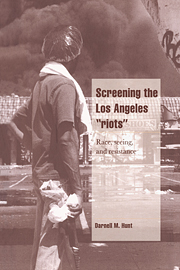Book contents
- Frontmatter
- Contents
- List of figures
- List of tables
- Preface
- 1 Introduction
- Part I Context and text
- Part II Audience
- 4 Stigmatized by association: Latino-raced informants and the KTTV text
- 5 Ambivalent insiders: black-raced informants and the KTTV text
- 6 Innocent bystanders: white-raced informants and the KTTV text
- Part III Analysis and Conclusions
- Postscript
- Appendix A Data and methods
- Appendix B Figures
- Appendix C KTTV Transcript
- Appendix D Questionnaires
- Appendix E Tables
- Notes
- References
- Index
4 - Stigmatized by association: Latino-raced informants and the KTTV text
Published online by Cambridge University Press: 23 January 2010
- Frontmatter
- Contents
- List of figures
- List of tables
- Preface
- 1 Introduction
- Part I Context and text
- Part II Audience
- 4 Stigmatized by association: Latino-raced informants and the KTTV text
- 5 Ambivalent insiders: black-raced informants and the KTTV text
- 6 Innocent bystanders: white-raced informants and the KTTV text
- Part III Analysis and Conclusions
- Postscript
- Appendix A Data and methods
- Appendix B Figures
- Appendix C KTTV Transcript
- Appendix D Questionnaires
- Appendix E Tables
- Notes
- References
- Index
Summary
[Latinos] just took advantage of it. Because they didn't even know what the hell was going on. It was none of their business what happened to Rodney King.
(Latino-raced informant)According to the United States Census Bureau, “Latinos” do not constitute a racial group. Instead, this rather heterogenous mix of people with Mexican, Cuban, Puerto Rican and other Central and South American backgrounds might be of any officially recognized “race,” or some combination of two or more of them. Indeed, in the last census these people were given the option of filling in a racial identification circle on the enumeration form. Mexican-Americans, for example, were evenly split between describing themselves as “white” or “other race” in 1990; virtually none considered themselves “black” (Skerry 1993).
In one sense, the term “Latino” suggests some type of panethnic solidarity across the various groups with Latin connections. Some scholars argue for the existence of this solidarity simply on the basis of these groups' shared experiences of discrimination and prejudice as Latinos – those who speak Spanish and/or exhibit other recognizable ties to a certain region of the world (Oboler 1992). At the same time, however, narrow nationalist sentiments do exist (e.g., “Chicano Power” versus “Latino Power”), sentiments that seem to invalidate notions of panethnic solidarity (Martinez 1990). Moreover, when particular groups within the “alliance” are singled out for analysis, it is often not clear whether they view themselves in ethnic terms (i.e., simply as culturally different) or minority terms (i.e., as systematically oppressed) (Skerry 1993). So what does it mean to speak of Latino-raced informants?
- Type
- Chapter
- Information
- Screening the Los Angeles 'Riots'Race, Seeing, and Resistance, pp. 53 - 76Publisher: Cambridge University PressPrint publication year: 1996

